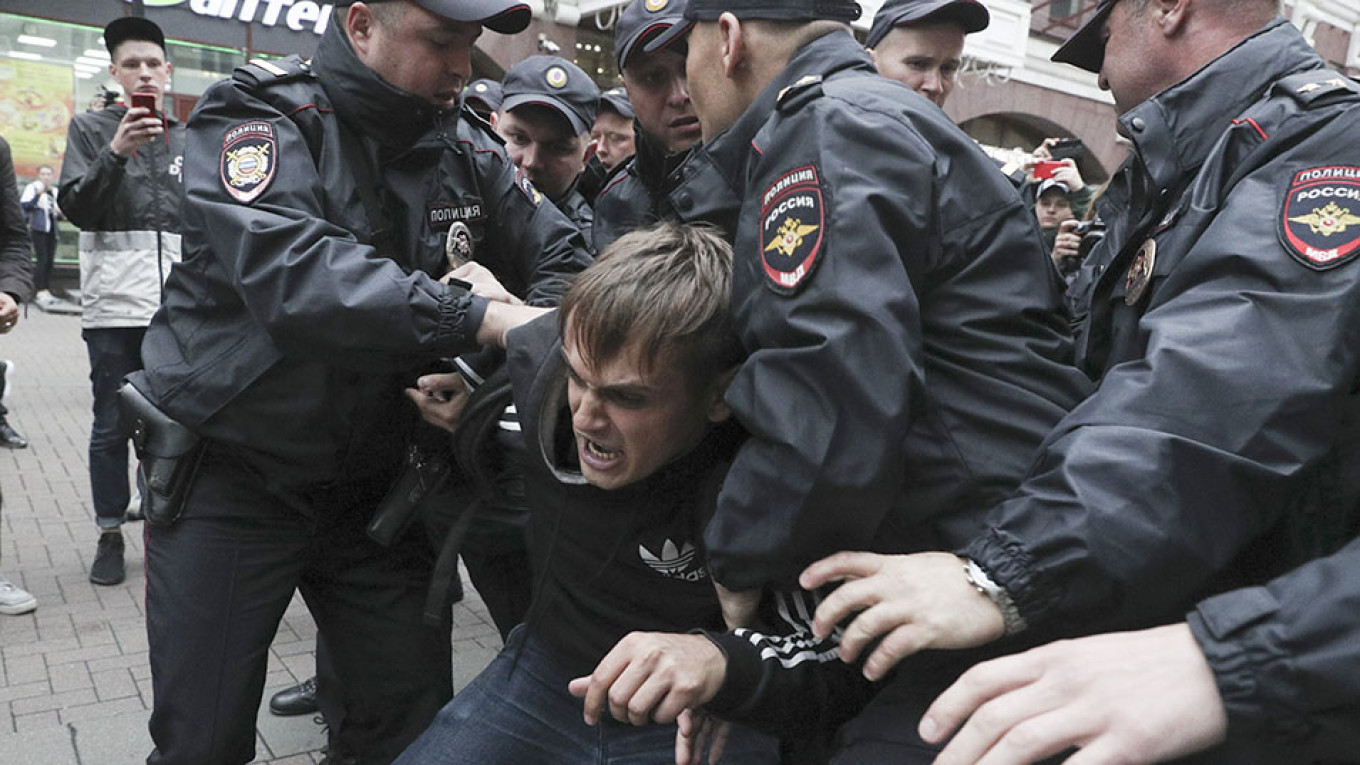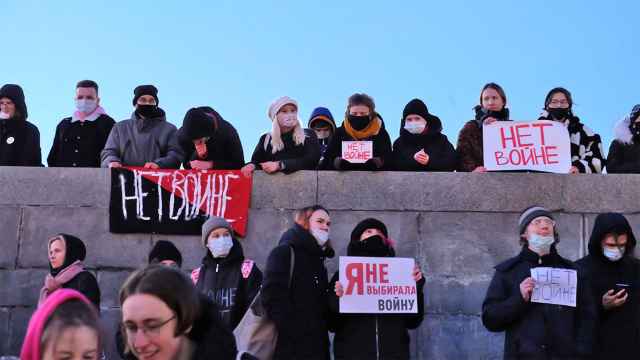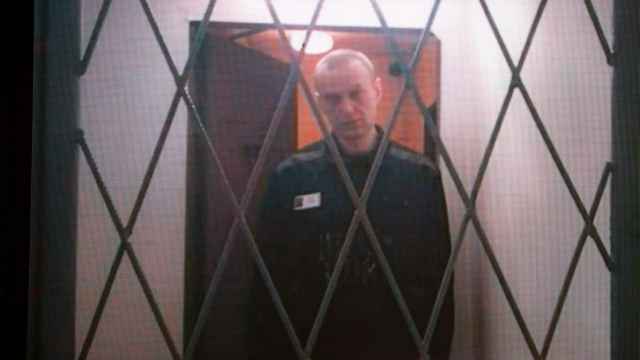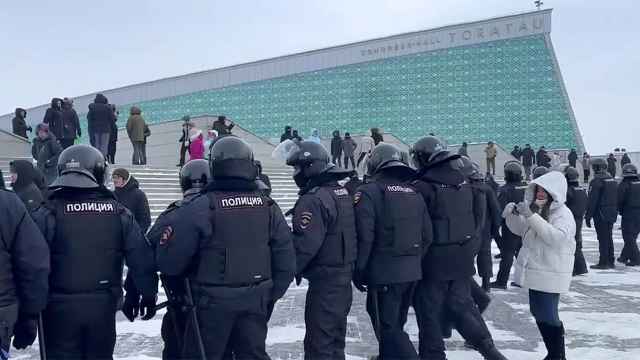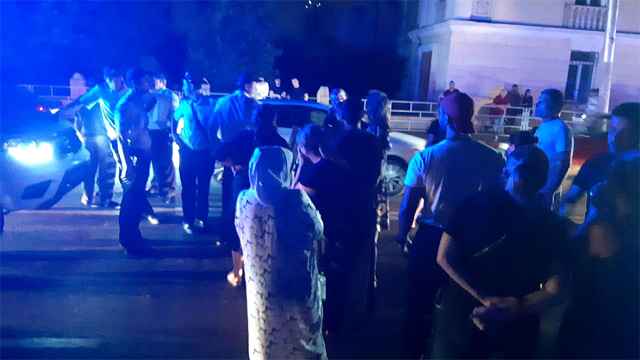Who knew the Kremlin's defenders were so fragile? Actor Pavel Ustinov has just been sentenced to three and a half years in prison for allegedly dislocating a National Guard officer's shoulder and chanting abuse, while being arrested at an unauthorized protest on 3 Aug., despite the video footage of him standing silently.
Earlier, Kirill Zhukov was sentenced for three years for tapping a riot policeman's helmet at a protest on 27 July, something that somehow became transmuted into a fully-fledged assault.
Rosgvardiya officers appear to be as delicate in spirit as body. Vladislav Sinitsa was sentenced to five years in a labor camp for a tweet in which he speculated that someday people may target officers acting abusively and their children would find out about it. This was characterized as a call for violence against those children.
Public prosecutors, though, suggest that such talk is not just “inciting hatred and enmity” but also traumatizing the armored riot police who demonstrated such enthusiasm for violence at the earlier protests.
While most of the more than 2000 people arrested during the demonstrations in Moscow before the recent council elections were freed, fined, or given minimal sentences, the state's eagerness to visit its displeasure on a seemingly-random selection of critics is more than just malice, it is a strategy.
The internet analogy
In many ways, this is an extension of its internet policy. Russia, unlike China, cannot lock itself permanently behind a virtual wall, and it has a lively, vibrant and irreverent online information space. It tries to block particularly problematic materials such as Alexei Navalny's video exposés of elite corruption, and drown out critical comments with torrents of rebuttal and misdirection.
After all, it is worth remembering that the infamous “troll farms” were initially established for domestic and not international purposes, and still largely operate in Russia.
None of this is enough, though, and so the authorities also rely on deliberately capricious prosecutions.
Much goes unpunished, but from time to time individuals find themselves in the Kremlin's crosshairs for the slightest of reasons, and the outcome can be disastrous.
In 2018, for example, Maria Motuznaya from Barnaul found herself facing a potential six-year spell in prison for “hate speech” and insulting religious believers' feelings for posting on her Vkontakte page a few questionable jokes and satirical memes.
The aim is to create a climate of fear and uncertainty. Individuals may know that their chances of being prosecuted for posting something of which the government disapproves are slim — but the consequences if that does happen are so serious, the state's hope is that it acts as a deterrence.
Furthermore, by being inconsistent and unclear as to quite what will arouse the ire of the authorities, it encourages individuals to censor themselves more rigorously than might otherwise be the case.
Where the red lines of impermissibility are clear, it is easy to tell where the danger lies.
When the red lines are unclear, quite possibly shifting invisibly from day to day, then the safe thing to do is to steer well clear of anything that may be risky.
Ultimately, the state's strategy — which is at best a partial success — is to rely on people policing themselves.
Arbitrary authoritarianism
A similar calculation appears to be at work in the punishment of protesters. Of course, there are the deliberate and directed prosecutions of particular targets.
The current round of investigations against Navalny's Anti-Corruption Foundation, for example, reflects a long-anticipated effort to break his bid to create a national political machine.
Otherwise, though, the arbitrariness is a result of a combustible compound of ambition and intent. Some judges and prosecutors are eager to use the opportunity to make their names.
In the main, though, the aim is simply to make even being close to an unauthorized protest dangerous.
After all, peaceful protesters can still find themselves labeled as violent rioters and even passers-by are at risk of being swept up into the police trucks.
The message is simple. If you want to protest, we may let you, but we might also beat you and arrest you, regardless of how you behave.
In this way, the authorities hope to prevent protests from becoming normalized and limit them to a hardcore who are willing to take that risk — no matter what it may mean for them, their job, their family.
But it also reflects genuine fear. To be sure, there is no doubt that at present, the state has all the coercive resources it needs and faces no serious challenge on the streets.
But uneasy lies the head that wears a crown, or a riot helmet.
As the country becomes increasingly restive, and Vladimir Putin fails to give any clear sense of his plans for 2024, a security elite that lived through the 1980s is uncomfortably aware of how quickly mass, grudging, apathy can turn into active dissent.
For some, the answer is fiscal stimulus and bread and circus for the population, or new political theatrics.
But for others, the lesson of the Gorbachev years is that the state must not only be strong and ruthless, but it must also show itself strong and ruthless. The Zhukovs are merely the object lessons of their (potentially self-destructive) strategy.
A Message from The Moscow Times:
Dear readers,
We are facing unprecedented challenges. Russia's Prosecutor General's Office has designated The Moscow Times as an "undesirable" organization, criminalizing our work and putting our staff at risk of prosecution. This follows our earlier unjust labeling as a "foreign agent."
These actions are direct attempts to silence independent journalism in Russia. The authorities claim our work "discredits the decisions of the Russian leadership." We see things differently: we strive to provide accurate, unbiased reporting on Russia.
We, the journalists of The Moscow Times, refuse to be silenced. But to continue our work, we need your help.
Your support, no matter how small, makes a world of difference. If you can, please support us monthly starting from just $2. It's quick to set up, and every contribution makes a significant impact.
By supporting The Moscow Times, you're defending open, independent journalism in the face of repression. Thank you for standing with us.
Remind me later.



